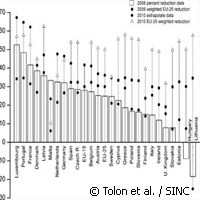Spanish engineers offer new formula to calculate reduction in road accident deaths
A team of engineers from the University of Almería (UAL) in Spain has developed a methodology to help meet the EU's ambitious target to significantly reduce the number of road deaths in the bloc. The EU's White Paper on Transport, adopted in 2001, calls for the number of deaths in road accidents to be halved by the end of 2010. The study was presented in the journal Accident Analysis and Prevention. Alfredo Tolón, a co-author of the mathematical formula and an engineer in UAL's Engineering Projects Department, said the methodology was 'novel', but 'easy to apply'. It makes it possible 'to calculate the weighted coefficients for reducing accident rates in various geographical areas by using an inverse logarithmic formula', he explained. Dr Tolón said the weighting was carried out for 25 of the 27 EU Member States and for 50 Spanish provinces, based on the understanding that the greatest effort to meet the 2010 objectives is required in those countries and provinces that reported the highest mortality rates in 2000. In that year, 52,536 people died in road traffic accidents in Europe, of whom 4,295 were Spanish. The researchers also compared the real evolution of road death data between 2000 and 2006 in order to check the validity of the methodology. They found a high correlation between the series of real data and that indicated by the model. Both showed that countries like Denmark, France, Luxembourg, Malta and Portugal have exceeded their assigned percentage and already taken successful steps to reduce road deaths. However, other Member States still need to make a concerted effort to solve this problem. Estonia, Lithuania, Hungary and Slovakia showed the worst results 'and the projections don't give much cause for optimism about them meeting the European objective', according to Dr Tolón. Given this outlook, the team has also calculated the weighted accident reduction rates for the 25 EU Member States in 2015, based on data from 2006, in order to obtain an overall reduction of 60%. As far as Spain is concerned, the scientists concluded that the provinces least likely to meet the targets on reducing road deaths were Huelva in the southwest of the country, Salamanca in the west and Malaga in the southern region of Andalusia. The northern province of Vizcaya was the only one in which the number of victims in 2006 fell by more than the figure proposed by the study, hence a drop of 61% compared to the 44.4% forecast. Other provinces making 'significant progress' were Guipúzcoa, Tenerife, Navarre, Soria, Barcelona, Álava and Madrid. 'Over recent years, however, there has been evidence of important progress in Spain, and by 2010 we may not be far off achieving the right level of reduction in road accident deaths,' said Dr Tolón. Data from the Spanish Directorate General for Traffic (DGT) showed that 2,181 people died on Spanish roads in 2008, a significant improvement compared to the 4,295 who lost their lives 8 years earlier. But even if much of the work has already been done, the Spanish engineer stressed the importance of this kind of study 'in order to open up the debate about the need for weighting in the application of global policies and to establish pragmatic objectives for reducing road accident rates'.
Countries
Spain



